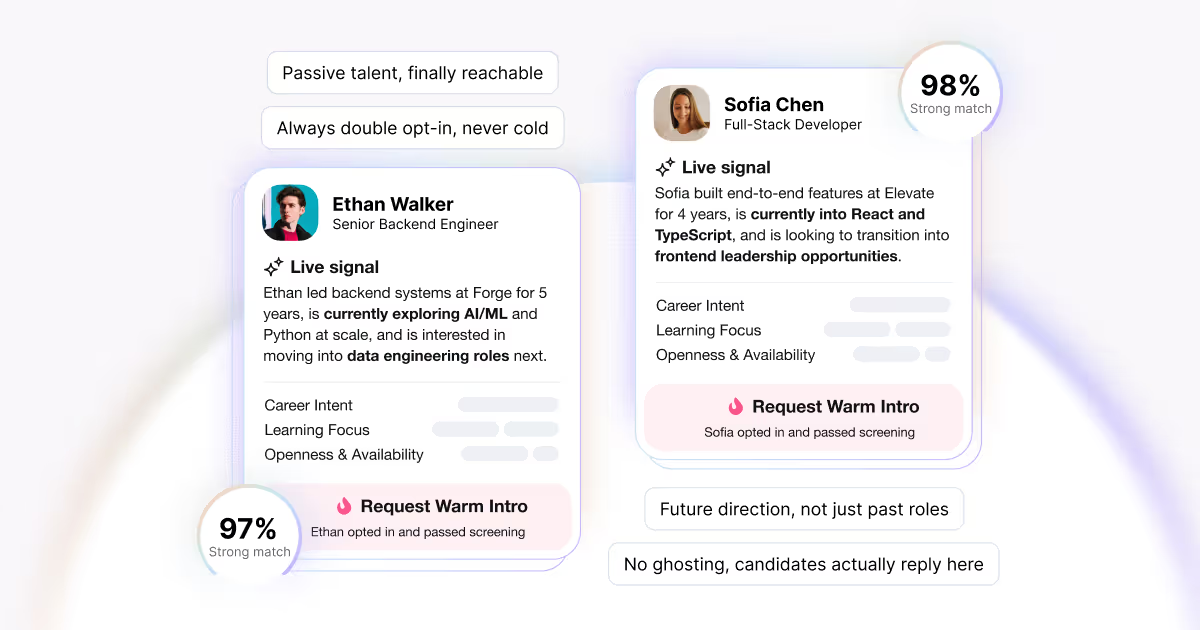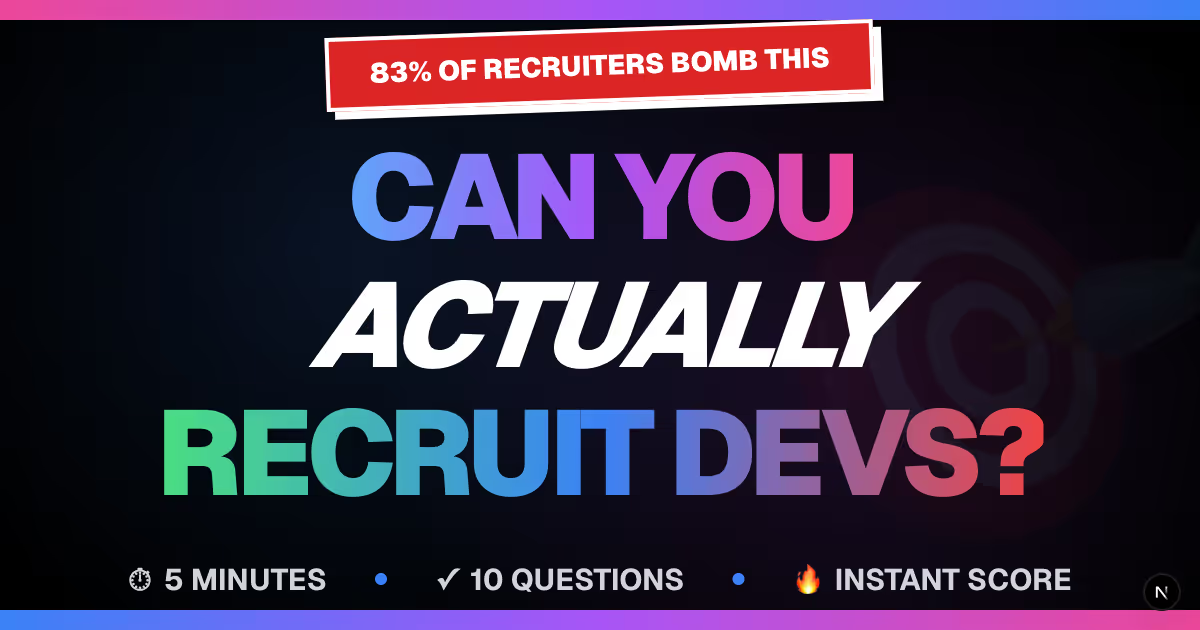


Explore the distinct strategies for hiring technical versus non-technical roles, focusing on skills assessment and candidate engagement.
Hiring for technical and non-technical roles requires different strategies. Technical hiring focuses on skills like coding, system design, and technical problem-solving, evaluated through coding tests, live interviews, and portfolio reviews. Non-technical hiring prioritizes interpersonal skills, role-specific competencies, and alignment with team dynamics, often assessed through behavioral interviews and situational questions. Both approaches demand tailored communication and tools to attract the right candidates.
Key takeaways:
- Technical roles: Emphasize coding expertise, technical challenges, and growth opportunities. Use platforms like GitHub, Stack Overflow, and code challenges for sourcing and evaluation.
- Non-technical roles: Highlight teamwork, communication, and alignment with company goals. Focus on personal connections and role-specific assessments.
Quick Comparison:
| Aspect | Technical Hiring | Non-Technical Hiring |
|---|---|---|
| Focus | Hard skills, coding, problem-solving | Soft skills, communication, team alignment |
| Assessment Methods | Coding tests, live coding, portfolio reviews | Behavioral interviews, situational tasks |
| Time Investment | Longer, detailed process | Faster, more streamlined process |
| Evaluation | Measurable, skill-based | More subjective, based on interaction |
For effective hiring, tailor your process to the role’s demands, use the right platforms and tools, and ensure your communication resonates with candidates' priorities.
Tech Recruiting Intensive: Proven Tactics for Hiring Software Engineers
1. Technical Hiring Methods
Technical hiring caters specifically to developers' unique work styles and career goals. The strategies used to attract and evaluate technical talent differ greatly from traditional recruitment approaches, requiring a more tailored and skill-focused process.
Sourcing Strategies
Developers often gather in online communities like GitHub, where their contributions, code quality, and collaboration skills are on full display. By examining repository activity, commit history, and the complexity of projects, recruiters can identify potential candidates with precision.
Another key platform is Stack Overflow, where developers showcase their problem-solving skills through questions and answers. The site's reputation system offers insights into a candidate's expertise and engagement. Other developer-focused communities, such as Reddit's programming subreddits, Hacker News, and specialized Discord servers, provide access to passive candidates who may not be actively seeking new opportunities but remain open to the right fit.
Open source contributors are particularly valuable in technical hiring. Their publicly available code allows recruiters to assess their skills before even initiating contact, making outreach more targeted and meaningful.
Once potential candidates are identified, the next step is implementing screening methods that highlight the strongest talent.
Screening and Assessment Methods
Technical screening prioritizes practical skills and problem-solving abilities over traditional resume reviews. Code challenges and take-home assignments are commonly used to evaluate candidates in real-world scenarios. These tasks often involve building small applications or solving algorithmic problems relevant to the role.
Live coding interviews are another popular method, especially for senior-level positions. These sessions often involve collaborative problem-solving or pair programming exercises where candidates work alongside team members to tackle challenges the company is actively addressing.
System architecture discussions are frequently part of technical phone screens. In these conversations, candidates explain how they would design systems or address scalability issues, offering insight into their technical expertise and communication skills - both crucial for leadership roles. For front-end developers and full-stack engineers, portfolio reviews are especially important, as they can showcase deployed applications and demonstrate hands-on experience.
Reference checks in technical hiring focus on specific aspects like code quality, debugging skills, and adaptability within existing codebases. Feedback from former managers or colleagues provides a deeper understanding of the candidate's technical judgment and ability to learn, which aren't always evident during interviews.
After these assessments, maintaining clear and timely communication becomes vital for keeping candidates engaged.
Communication and Candidate Experience
Developers value recruiters who understand their field and can communicate in a way that resonates with them. Generic outreach often leads to poor response rates, while personalized messages that reference specific technologies, projects, or contributions are far more effective. Highlighting relevant tech stacks and challenges in outreach messages can make a significant difference.
Transparency during the interview process is equally important. Candidates appreciate clear information about technical expectations, development environments, deployment practices, and infrastructure. They often ask detailed questions about code reviews, testing protocols, and how the company handles technical debt.
Timely feedback is critical in technical hiring. Developers expect quick responses and detailed feedback on coding challenges. Delays can result in losing top candidates to competitors with faster, more efficient processes. Even when rejecting candidates, providing constructive technical feedback helps maintain a positive reputation within the developer community.
Tools and Platforms
Technical recruiting requires tools that go beyond standard applicant tracking systems. Code assessment platforms enable consistent and fair evaluations, while GitHub integration tools allow recruiters to monitor candidate contributions and activity. Automated screening tools also help by parsing technical resumes for programming languages, frameworks, and relevant experience.
Platforms like daily.dev Recruiter address common challenges in technical hiring by connecting recruiters with developers in their natural professional spaces. Its warm, double opt-in introduction system eliminates the awkwardness of cold outreach, ensuring that every interaction starts with mutual interest. This approach significantly boosts response rates compared to traditional sourcing methods.
Video interview tools with built-in code-sharing features allow for real-time coding collaboration. Some even integrate with development tools, enabling candidates to work within actual development environments during interviews, offering a more realistic evaluation of their skills.
Specialized tools like candidate relationship management systems help track technical skills, project preferences, and career progression over time. These platforms allow recruiters to build long-term relationships with passive candidates, ensuring they can reach out when the right opportunity arises. Together, these tools support a more effective and efficient technical hiring process.
2. Non-Technical Hiring Methods
Unlike technical assessments, which focus on specific skills, non-technical hiring prioritizes evaluating interpersonal abilities and how well a candidate aligns with the company’s values and team dynamics. This process digs into soft skills, teamwork, and how effectively a candidate can contribute to the company’s broader goals.
Recruiters often rely on tailored interview techniques to explore a candidate’s past experiences. These conversations help gauge communication skills, problem-solving abilities, and how well they might fit within the company culture. The goal is to find individuals who can seamlessly integrate into teams and foster collaboration. By focusing on these aspects and maintaining clear, personalized communication during the hiring process, companies can ensure new hires are ready to strengthen teamwork and support business objectives.
sbb-itb-d1e6221
Benefits and Drawbacks
Let’s break down the strengths and challenges of technical and non-technical hiring methods. Each approach offers unique advantages but also comes with its own set of obstacles. Understanding these trade-offs is key to shaping a recruitment strategy that fits each role’s needs.
Technical hiring is designed for roles that demand advanced development skills. It often relies on structured assessments like coding tests and technical interviews. This approach ensures candidates have the necessary expertise for complex tasks. However, it can be time-consuming and may unintentionally exclude talented individuals from non-traditional backgrounds.
On the other hand, non-technical hiring emphasizes soft skills, adaptability, and alignment with company values. This method tends to be quicker and less resource-intensive. That said, evaluating soft skills can be subjective, which makes it harder to ensure consistency across different interviewers.
Here’s a quick comparison of the two approaches:
| Aspect | Technical Hiring | Non-Technical Hiring |
|---|---|---|
| Primary Focus | Hard skills, coding ability, technical problem-solving | Soft skills, cultural fit, communication abilities |
| Assessment Methods | Coding tests, technical interviews, portfolio reviews | Behavioral interviews, case studies, role-playing scenarios |
| Time Investment | Longer, more detailed process | Faster, more streamlined |
| Evaluation Objectivity | Based on measurable technical outputs | More subjective |
| Risk Considerations | Lower risk for technical competency; team fit still a factor | Relies heavily on matching compatibility with role |
While technical hiring often incurs higher costs due to specialized tools and resources, non-technical hiring is generally more budget-friendly. That said, both methods carry risks - poor execution can lead to mismatches, regardless of the approach.
From the candidate’s perspective, technical professionals often value in-depth, skills-focused evaluations and clear expectations about challenges. Meanwhile, non-technical candidates tend to appreciate a quicker process that highlights company culture and the role’s specifics.
When scaling, technical hiring can become particularly tricky. It requires niche expertise for evaluations and a limited pool of assessors, making it harder to manage at scale. Non-technical hiring, while easier to scale, demands consistent standards across various hiring managers to maintain quality.
Conclusion
Success in hiring hinges on tailoring your strategies to the unique demands of each role. For technical positions, focus on real-world coding challenges and robust assessment tools that reflect the actual work environment. Engage with technical communities and use developer-centric platforms to connect with top talent. Be upfront about challenges and opportunities for growth - this transparency resonates with technical candidates.
When it comes to non-technical roles, emphasize your company’s mission and culture. Behavioral interviews and situational questions can help you assess soft skills and adaptability, which are often key for these positions. Building personal connections and clearly outlining career growth paths can make a significant impact on these candidates.
The takeaway here is simple: one size doesn’t fit all. A software engineer assessing your coding tests will prioritize different aspects than a marketing manager reviewing your company’s culture. Your communication, evaluation processes, and timelines should reflect what matters most to each type of candidate.
To ensure success, align your evaluation metrics with the priorities of each role. For technical roles, this might mean focusing on coding proficiency and candidate satisfaction with the process. For non-technical roles, metrics like cultural alignment and retention rates may be more telling. Create separate playbooks for technical and non-technical hiring to streamline each process without sacrificing quality. While technical hiring might require more time and specialized expertise, non-technical roles often benefit from quicker timelines and broader team involvement.
Tracking outcomes specific to each role - such as technical assessment accuracy or cultural fit - will allow you to refine your approach over time. Organizations that thrive in today’s competitive job market are those that understand these differences and adapt their strategies to meet the expectations of diverse talent pools.
FAQs
What are the best ways to source technical talent, and how do they differ from traditional hiring methods?
To find top-notch technical talent, focus on targeted outreach using platforms like GitHub, Stack Overflow, and specialized tech job boards. You can also connect with skilled developers by engaging in open-source communities, hosting webinars, or organizing coding workshops. These approaches prioritize building relationships and actively seeking out qualified candidates.
Unlike traditional hiring methods, which often depend on broad job postings and waiting for applicants, sourcing technical talent demands a more focused and hands-on approach. By tapping into industry-specific channels and building connections within tech communities, you can attract highly skilled professionals more efficiently and create a smoother hiring process.
How can companies fairly and consistently evaluate soft skills when hiring for non-technical roles?
To create a consistent and unbiased approach to evaluating soft skills during non-technical hiring, companies can rely on structured assessments. These might include tools like pre-employment tests, role-playing scenarios, and competency-based frameworks, all of which establish clear, standardized criteria for assessing candidates.
Incorporating a standardized scoring system during interviews can further enhance objectivity. By blending methods such as behavioral interview questions, personality assessments, and real-time observations, companies can minimize bias. This ensures that all candidates are measured against the same benchmarks, leading to fairer and more dependable hiring outcomes.
What are the risks and benefits of using specialized tools for hiring technical talent?
Specialized tools for technical hiring can make a big difference by boosting efficiency, expanding your candidate reach, and using automation to match the right talent to the right roles. By streamlining the hiring process, these tools save time and help you zero in on the most qualified candidates.
That said, they’re not without their challenges. Automated systems can sometimes bring in unintended algorithmic bias, face technical issues, or miss out on the personal connection needed to assess soft skills and how well someone might fit with your team. The key is finding the right balance - leveraging technology while still keeping human judgment at the forefront to ensure a fair and effective hiring process.
Related Blog Posts








